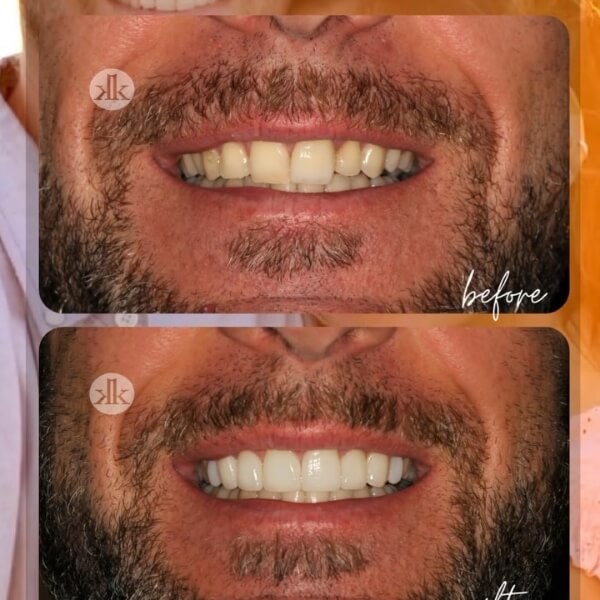
Periodontal Care in San Diego, CA
Your smile reveals your joy and confidence to the world. At La Jolla Cosmetic Dentistry & Orthodontics, Dr. Kohani and his dedicated team are committed to helping you maintain ideal oral health, a large part of which includes periodontal care. While discoloration and decay can cause cosmetic issues and sometimes severe problems for teeth, it’s the status of your gums and underlying bone that determines whether they get loose or fall out altogether.
While your gums may seem healthy, if you do not practice a vigilant oral hygiene routine, you risk developing some form of periodontal disease. This condition affects the gums and has multiple stages, each becoming more severe if left untreated.
Receiving regular dental checkups at La Jolla Cosmetic Dentistry & Orthodontics helps ensure your gums remain healthy. If you show signs of gum disease, our San Diego dentist can treat it. Dr. Kohani offers several options to restore gum health and prevent the progression of periodontal disease.
Dr. Kohani also provides sedation dentistry for patients who experience anxiety or have dental phobias to make your experience with us a positive one.
How It Works
What Is the Process for Periodontal Treatment?
Step One
Call (858) 295-0603 or use our online contact form to schedule an appointment at La Jolla Cosmetic Dentistry & Orthodontics.
Step Two
Discuss your symptoms with Dr. Kohani and undergo a thorough examination to assess gum health.
Step Three
Mild gum disease can be addressed with scaling and root planing (deep cleaning) and an antibacterial mouthwash. In more serious cases, Dr. Kohani will explain your treatment options.
Step Four
Undergo the appropriate procedure(s) to restore proper gum health and follow instructions to maintain your oral health.
“At our practice, we do not cut corners. We only use the most advanced, cutting-edge equipment available.”rn— Dr. Kohani
-
Custom Treatment
Dr. Kohani offers the following treatment options to reduce your risk of gum disease and restore periodontal health if it exists. Custom treatment plans to address gum disease at La Jolla Cosmetic Dentistry & Orthodontics start with a consultation. Our San Diego dentist will listen carefully to your dental concerns and goals, answer questions, examine your teeth and gums, order imaging, and recommend the most appropriate treatment(s).
Because periodontal disease occurs in stages, your treatment will likely vary depending on the severity of your case. Whether you have gingivitis or periodontitis, the goal of periodontal disease treatment is to eliminate the infection as much as possible and save your natural dentition. However, getting there may involve one or more treatment methods.
Periodontal procedures can include:
-
Scaling And Root Planing
The most common way to combat periodontal disease is with a deep cleaning process, otherwise known as scaling and root planing. If our dental hygienist feels you may require a deep cleaning, our specialist will measure your gum pockets to confirm.
This minor procedure can begin on the same day, but in most cases, the treatment will be performed one section (or one side) at a time, and you may need to schedule a separate appointment to complete the treatment.
- The first step of a deep dental cleaning is called scaling. Plaque and tartar are removed from below the gum line.
- The second step of a deep dental cleaning is called root planing. The root surfaces of your teeth are scraped and smoothed to encourage gum tissue to reattach firmly to the tooth roots.
These steps are typically performed on one side of the mouth during the first appointment and the other at a subsequent appointment.
-
Flap Surgery
When deeper pockets have begun forming around teeth, treating the receding gums is necessary to prevent bacteria from spreading. Flap surgery involves removing the plaque below the gum line and then placing the gums back around the tooth using sutures.
-
Gum Grafting
In cases where the teeth and gums have begun to atrophy due to periodontitis, gum grafting may be the most effective option to maintain your natural dentition. Either guided tissue regeneration or a soft tissue graft can be used to regrow gum tissue. Grafting procedures help regenerate bone or tissue that has been lost. If resorption has caused severe bone loss, a bone graft may be necessary.
Call our San Diego, California, periodontal care provider at (858) 295-0603 to schedule your consultation.
What Can I Expect During Recovery From Periodontal Treatment Procedures?
Your recovery period depends on the procedure(s) required to restore your gum health. Downtime can range from none (for scaling and root planing) to a substantial period (for gum grafting).
If Dr. Kohani expects you to experience discomfort, he will likely prescribe pain medication to help you manage it.
How Do I Maintain My Gum Health After Periodontal Care?
Regular dental visits and a commitment to strict oral hygiene habits are essential to prevent and maintain gum health. Dr. Kohani will advise you of any additional care necessary for your gums to heal and remain healthy according to your individual needs.
Call (858) 295-0603 to reach Dr. Kohani’s San Diego office and schedule your periodontal checkup today.
Testimonials
Our patients LOVE us, and you will too!
Dr. Kohani changed my smile by using his special veneering technique with minimal alteration of my own teeth. He is an absolute perfectionist and does unbelievable work. No one can tell I have veneers; they just notice my bright and shining smile.
I have gone to Dr. Kohani a few times now and have had nothing but great experiences. I was impressed with the friendly staff that is welcoming and organized. We all know these visits aren’t necessarily ones we look forward to, but Dr. Kohani makes this experience quite pleasant…
I was new to La Jolla, out looking for a dentist and I actually walked into Dr. Kohani’s office by mistake. Well, it was one of the best mistakes I made. My teeth needed a ton of work and Dr. Kohani did a beautiful job. I needed fillings, root canals and veneers. Dr. Kohani was able to do it all…
Periodontal Care FAQ
What are the common symptoms of periodontal disease?
Common symptoms of periodontal disease include swollen, tender, or bleeding gums, persistent bad breath, receding gums, loose or shifting teeth, changes in the fit of dentures, and the formation of pockets between the gums and teeth. It’s essential to seek professional dental care if you experience any of these symptoms.
How is periodontal disease diagnosed?
Periodontal disease is typically diagnosed through a comprehensive dental examination, which may include a visual inspection of the gums, measurements of pocket depths using a periodontal probe, dental X-rays to assess bone loss, and other diagnostic tests as needed. Early detection and intervention are crucial for managing periodontal disease effectively.
What are the treatment options for periodontal disease?
Treatment for periodontal disease varies depending on the severity and extent of your condition. Periodontal care procedures include professional dental cleanings, scaling and root planing (deep cleaning), antibiotic therapy, laser therapy, and surgical procedures such as flap surgery or bone grafting to restore damaged tissues and promote gum and bone regeneration.
Can periodontal disease be prevented?
Yes, periodontal disease can be prevented with good oral hygiene practices, including brushing your teeth at least twice a day, flossing daily, using an antimicrobial mouthwash, and scheduling regular dental check-ups and cleanings. Avoiding tobacco products, eating a balanced diet, and managing systemic health conditions such as diabetes can also help reduce the risk of periodontal disease.
What role does nutrition play in periodontal health?
Proper nutrition plays a vital role in maintaining periodontal health. Eating a balanced diet rich in fruits, vegetables, whole grains, lean proteins, and dairy products provides essential nutrients that support gum and bone health. Limiting sugary snacks and beverages, which can contribute to plaque buildup and tooth decay, is also important for preventing periodontal disease.
How often should I have my teeth professionally cleaned to prevent periodontal disease?
The American Dental Association recommends having your teeth professionally cleaned by a dental hygienist at least once every six months as part of a comprehensive preventive care plan. However, individuals with a history of periodontal disease or other risk factors may require more frequent cleanings to maintain optimal oral health.
Is periodontal disease reversible?
Gingivitis and early periodontal disease may be reversible with proper oral hygiene and professional dental care. However, once periodontal disease progresses to more advanced stages, such as periodontitis, it often cannot be fully reversed. However, its progression can be managed and controlled through ongoing treatment and maintenance to prevent further damage and preserve oral health.
Patient Portal Login













